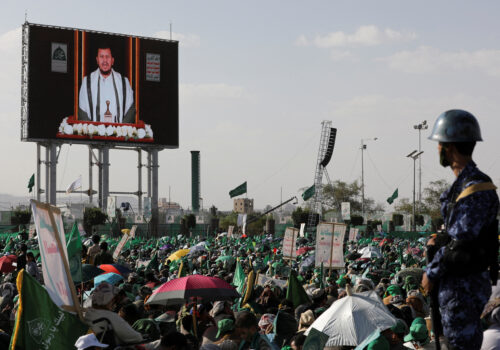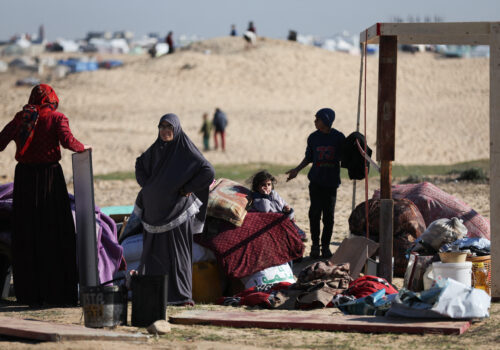The escalation no country in the Middle East wants but still pushes toward
US Secretary of State Antony Blinken has returned from a fourth visit to the Middle East with the clear objective of preventing regional escalation from the Israel-Hamas war.
This concern is shared by all countries in the region, who, for various reasons, understand how the evolution of current tensions into a wider conflict could generate catastrophic consequences for their interests at large.
Israel does not want a regional escalation because it has to manage a complex military operation in the Gaza Strip that is far from producing the results that Prime Minister Benjamin Netanyahu promised. Palestinian militants have not only not been defeated nor eradicated from Gaza, but it is not at all clear how the Gaza Strip will be governed when the conflict ends and by whom. Moreover, the war has only pushed to the background, but not resolved, the deep political crisis of the far-right government headed by Netanyahu and its judicial vicissitudes. It is, therefore, evident how a regional escalation, with the risk of direct involvement from Iran and Hezbollah in Lebanon, represents an untenable risk variable for Israel, which could lead to the opening of new and far more complex fronts on which to fight.
Paradoxically, however, regional escalation also poses a real risk for Hezbollah and Iran. For Lebanon’s Shia militia, the possibility of a direct conflict with Israel would almost certainly result in a political crisis at the national level that would risk dragging Beirut back into a civil war after more than four years of economic collapse, parliamentary deadlock, and growing tensions between the country’s different confessional groups. For Tehran, on the other hand, a regional escalation could result in the United States and Israel entering a conflict dynamic capable of reaching the country directly. Not least, a military confrontation could result in the re-emergence of demonstrations by Iranians generally upset by the regime’s handling of everyday life.
At the same time, escalation concerns are also alarming for other countries in the region, as they would be immediately and directly affected despite not being directly involved in the war. Syria could become one of the hottest fronts in countering Iran’s role in the region, thus, thwarting the strenuous efforts of the Bashar al-Assad regime to emerge from a bloody decade of civil war. Jordan, with over three million refugees in its territory—most of them Palestinians—would likely become the epicenter of Palestinian demands, straining the Hashemite Kingdom’s resilience. Egypt, beset by a severe economic crisis, would also have to deal with increasingly large refugee flows into the Sinai region from Gaza. Additionally, it may also have to confront the emergence of domestic anti-Israeli sentiment and the possible resurgence of the ousted Muslim Brotherhood, potentially setting the stage for a crisis that Cairo is in no way willing to address. Finally, Gulf monarchies may have to deal with potential fallout from Iran’s threat to turn the Strait of Hormuz—where 20 percent of the world’s oil passes through—into a war zone by blocking the waterway.
Another potential consequence could be the possible re-emergence of Islamist-backed terrorism, which would disrupt social and economic order across the region. As it is, in the Red Sea, the Houthi rebels are increasing their attacks against international naval security for the precise purpose of raising the stakes with their long-time rival Saudi Arabia (rather than supporting the Palestinian cause). However, this pretext of fighting for the defense of Palestinian rights may become the reason for their entanglement into a larger conflict. Despite this picture of collective risk for the entire region, however, each country seems to be forced to make choices that increase the risk of regional escalation every day.
Israel is caught between a rock and a hard place. On the one hand, it must deal with growing international dissatisfaction over the high number of casualties generated by the intervention in Gaza without having a viable solution for either the management of the conflict or the post-conflict future of the government in the Gaza Strip. On the other hand, Hamas’ blatant resilience, the continued firing of rockets into Israel, and Iran’s ability to supply its regional allies dictate not only the continuation of operations in Gaza, but also the need to strike Hezbollah in southern Lebanon, Hamas leaders in Beirut, and the storage locations of Iran-supplied weapons in Syria, generating continued retaliation and an exponential increase in risk.
The United States is demanding that Israel find a solution to its war with Hamas. But since Iran emboldens Hamas, this translates into finding a solution with Iran. Iran, however, is not currently amenable to negotiating given its perception of continued American and Israeli aggression against its allies in the region, which allows it little space to maneuver. Even if a potential Iranian reformist elite wanted dialogue with the West, this would be undermined by hardliners’ objections over what they deem to be violent American behavior. This represents a dynamic that generates increasing violence, from which even Washington does not seem to know how to extricate itself. The current situation is further complicated by the disastrous perception that the US is withdrawing from the region. Hezbollah does not intend to get involved in a conflict. However, it has increased its assertiveness against Israel through continuous missile launches and rapid raids against the Israel Defense Force (IDF), provoking a constant Israeli response.
Finally, the situation in Iran is even more complex, where the political polarization between the first and second generations of revolutionary leaders results in systematic discord in institutional positions, ranging from the former’s desire to pursue traditional pragmatism to the latter’s impetuousness. Although Iran has no interest in a regional escalation, the need to support its regional allies, Israel’s continued strikes on its logistical chains in Lebanon and Syria, and the recent assassination of Islamic Revolutionary Guard Corps commander Seyed Razi Mousavi and five military advisors in Syria, are likely to result in Tehran acting with increased assertiveness. It is clear how this dynamic poses the real risk of fueling an escalation.
No country in the Middle East and North Africa wants a regional conflict. Nevertheless, each country acts in such a way that exponentially increases its likelihood, trapped in a dynamic that finds no capacity for mediation while displaying the limitations and weaknesses of each actor. If this continues, the probability of an escalation to an all-out war increases exponentially.
Karim Mezran is resident senior fellow at the Rafik Hariri Center for the Middle East at the Atlantic Council.
Nicola Pedde is the Director of Institute for Global Studies in Rome, Italy.
Further reading
Sat, Jan 13, 2024
In Yemen and elsewhere, manageable local issues are driving an unmanageable regional crisis
MENASource By Borzou Daragahi
The United States and international response should remain otherwise measured so as not to play into the hands of the Houthis.
Wed, Jan 10, 2024
Egypt was mediating a deal to end the Gaza war. Then Saleh Al-Arouri was assassinated.
MENASource By Shahira Amin
Keen on regaining its traditional leadership role as chief mediator between Israel and the Palestinians, Cairo had put forward a three-stage plan to end the conflict.
Fri, Jan 12, 2024
Six big questions about US-led strikes against the Houthis, answered
MENASource By Kirsten Fontenrose
Ahead of authorizing the strikes, Biden had to carefully consider arguments for and against conducting strikes to limit the Houthis’ capacity to continue waging war on international shipping.
Image: An Iranian protester is carrying a portrait of the former commander of the Islamic Revolutionary Guard Corps' (IRGC) Quds Force, General Qassem Soleimani, while standing next to an Israeli flag during an anti-U.S. and anti-British protest gathering in front of the British embassy in downtown Tehran, Iran, on January 12, 2024. The United States and Britain are conducting airstrikes against Houthi militants in Yemen on the same day. (Photo by Morteza Nikoubazl/NurPhoto)


